This month we bring you news that:
- Colombia – The Colombian NGO Indepaz found that 187 social leaders and human rights defenders were killed in 2023, about the same number as in 2022 and 2021. There is still time to sign Amnesty International’s petition demanding that the Colombian Government improves its protection of human rights defenders, in particular members of the NGO CREDHOS.
- Brazil – Amnesty International has reiterated its demand that the killers of the human rights defender and politician Marielle Franco and her driver Anderson Gomes be brought to trial, almost six years after the assassination.
- Peru – The UN Special Rapporteur on the rights of indigenous peoples has warned that changes to Peru’s Forestry and Wildlife Law could legalise and encourage the dispossession of Indigenous Peoples from their lands
- Chile – Amnesty International’s report “Eyes on Chile” and several campaigns since the repressive response to the 2019 protests – including the current Urgent Action – have called for an end to impunity for those who were in charge
- Argentina – We have a new Urgent Action: Pierina Nochetti, a lesbian human rights activist, is facing criminal charges of “aggravated damage”.
- Venezuela – We have published a new Urgent Action calling for the removal of a bill which will potentially criminalize Venezuelan NGOs.
COLOMBIA
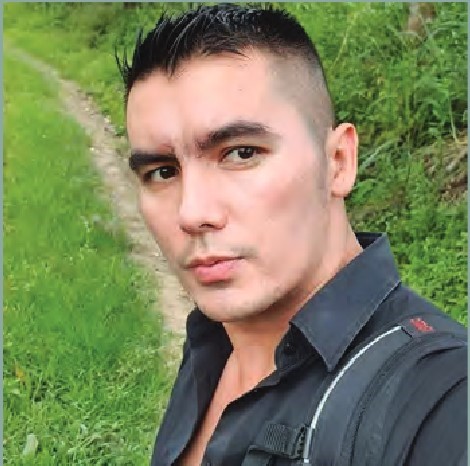
The Colombian NGO Indepaz found that 187 social leaders and human rights defenders were killed in 2023, about the same number as in 2022 and 2021. 44 former FARC guerrillas were killed in 2023, a slight reduction from the prior two years. A further 55 people were killed by landmines and 167,000 people were forcibly displaced in the year. In broad terms, violence continues at a high level despite the Government’s efforts to negotiate ceasefires with armed opposition groups. A more detailed analysis will be published by Programa Somos Defensores later in the year.
There is still time to sign Amnesty International’s petition demanding that the Colombian Government improves its protection of human rights defenders, in particular members of the NGO CREDHOS.
Justice for Colombia carries an update on the peace talks with the ELN and EMC guerrillas. Negotiations with the ELN (National Liberation Army) are into their sixth cycle of talks in Havana. Negotiators will focus on a ceasefire extension, an end to hostage-taking and enhancing the participation of civil society groups. Meanwhile, the EMC (FARC members who refused to abide by the 2016 Peace Accord) have agreed a six-month ceasefire extension to 15 July.
The BBC reports that the Colombian Government has approved regulations that encourage indigenous and Afro-descendant communities to produce energy from renewable sources and sell the power to the national grid. Over 70% of the country’s energy is supplied by hydroelectric dams, which can harm the environment and local communities. President Petro says that he wants to diversify Colombia’s energy mix.
The body of Eimer Emilio Gómez David, former member of the Peace Community of San José de Apartadó (PCSJA), was found 12 December. He had been tortured and killed, presumably by former paramilitaries who still operate in the region. The PCSJA reports that former paramilitaries continue to occupy their territory and threaten their members while soldiers from the 16th Brigade stand idly by. The Chief of the Joint Chiefs of Staff recently wrote to AIUK’s Mayfair and Soho Group to say that he had given orders to the Brigade to hunt down these former paramilitaries.
BRAZIL
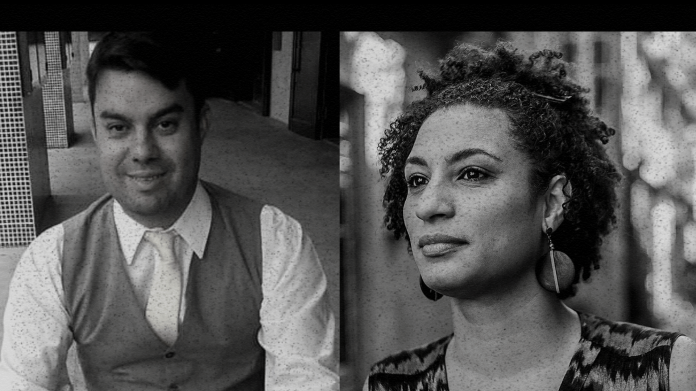
Amnesty International has reiterated its demand that the killers of the human rights defender and politician Marielle Franco and her driver Anderson Gomes be brought to trial, almost six years after the assassination. Two policemen have been held in custody since 2019, with one of them confessing to the crime in 2023. The delay is related to the investigation into who ordered the assassination. 24 January, amid rumours that they are offering a plea bargain to the second killer, the outgoing Justice Minister refused to say if this was so.
While individual supporters of Bolsonaro who ransacked Brazilia’s Presidential palace, Supreme Court and Congress 8 January last year have been arrested and charged, the first senior leader behind the attempted coup has been targeted by Federal Police. They raided the home and office of Senator Jordy, Chief Opposition Whip in the House. The Brazilian Report showed that far-right lawmakers were inciting an insurrection in November 2022, before Lula’s January 2023 inauguration. No lawmaker was mentioned in the Congressional investigation into the riots and insurrection.
The Guardian reports that the Senate has passed a law that effectively curtails the right of indigenous communities to register new land claims. This follows an earlier law which was struck down as unconstitutional by the Supreme Court and later vetoed by President Lula. The Senate is controlled by parties opposed to Lula. Indigenous organisations, left-wing parties and the Minister for Indigenous Affairs have said they will make an appeal to the Supreme Court.
PERU
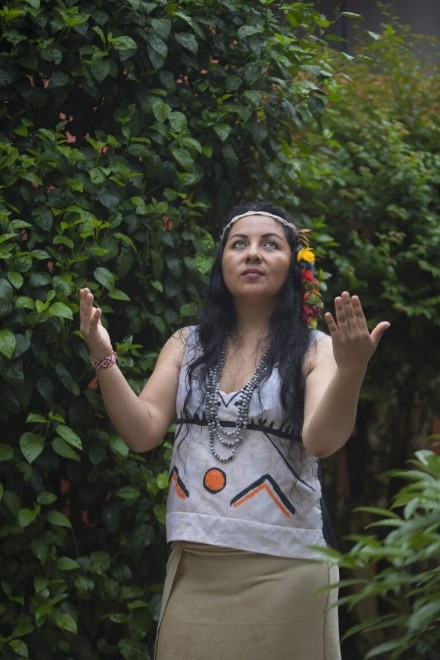
The UN Special Rapporteur on the rights of indigenous peoples has warned that changes to Peru’s Forestry and Wildlife Law could legalise and encourage the dispossession of Indigenous Peoples from their lands and threaten their physical and cultural survival. The revised law permits the clearing of forested lands for agricultural purposes or other economic activities without requiring consideration of the existing forest ecosystems. The law explicitly mentions native and peasant communities and Indigenous Peoples in voluntary isolation but has not gone through a consultation process with a view to obtaining the free, prior and informed consent of these Peoples.
CHILE
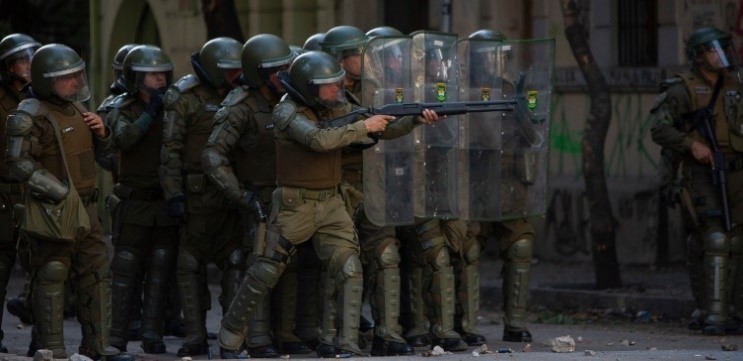 Amnesty International’s report “Eyes on Chile” and several campaigns since the repressive response to the 2019 protests – including the current Urgent Action – have called for an end to impunity for those who were in charge. Now an indictment has been filed against three current and former senior commanders of Carabineros de Chile, including the the current Director General of Carabineros, Ricardo Yáñez. Amnesty International considers this development a step towards justice for the grave and widespread human rights violations committed during the response to the protests.
Amnesty International’s report “Eyes on Chile” and several campaigns since the repressive response to the 2019 protests – including the current Urgent Action – have called for an end to impunity for those who were in charge. Now an indictment has been filed against three current and former senior commanders of Carabineros de Chile, including the the current Director General of Carabineros, Ricardo Yáñez. Amnesty International considers this development a step towards justice for the grave and widespread human rights violations committed during the response to the protests.
ARGENTINA
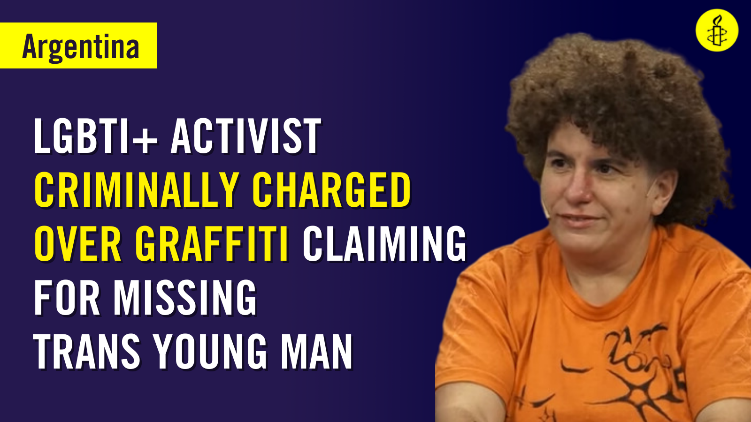 We have a new Urgent Action: Pierina Nochetti, a lesbian human rights activist, is facing criminal charges of “aggravated damage”. Pierina is one of many campaigning over the disappearance of a young trans man, Tehuel de la Torre, last seen on 11 March 2021. She is alleged to have painted graffiti on a wall with the question “Where is Tehuel?”. Her trial is scheduled for 6 March and she is facing a sentence of up to 4 years in prison. The charges appear to be an unnecessary and a disproportionate restriction to the right to freedom of expression, and the Urgent Action calls for them to be dropped.
We have a new Urgent Action: Pierina Nochetti, a lesbian human rights activist, is facing criminal charges of “aggravated damage”. Pierina is one of many campaigning over the disappearance of a young trans man, Tehuel de la Torre, last seen on 11 March 2021. She is alleged to have painted graffiti on a wall with the question “Where is Tehuel?”. Her trial is scheduled for 6 March and she is facing a sentence of up to 4 years in prison. The charges appear to be an unnecessary and a disproportionate restriction to the right to freedom of expression, and the Urgent Action calls for them to be dropped.
Female journalists who write about gender issues say they are having to deal with a toxic wave of threats against them in Argentina. The country legalised abortion in 2020, but its newly elected far-right libertarian president, Javier Milei, campaigned to overturn the law. And the libertarian movement that helped propel Milei to power appeared to deliberately target feminists when it started building its follower base in 2018. “We are facing a witch-hunt from the ultra-right,” said feminist writer Luciana Peke who has gone into exile.
Trade unions, opposition parties, social and human rights organisations organised a national strike and demonstration on 25th January. There were also rallies around the country and a challenge to the new government proposed changes to labour legislation in the courts. The protests focussed on President Milei’s emergency decree, announced on taking office, and Omnibus Bill. As well as introducing severe economic measures, the decree and bill will impact on social and human rights.
Prior to the protests, Argentine law enforcement authorities were banned by Federal Judge Ernesto Kreplak from filming the demonstrations. The judge stated that “filming and/or intercepting people without a warrant for the mere fact of presuming that they are going to participate in a social mobilization would imply an illegitimate restriction to their freedom of movement and other constitutional rights.”
VENEZUELA
On 9th January 2024, the National Assembly of Venezuela resumed consideration of a bill that will restrict and potentially criminalize and close down non-governmental organisations (NGOs) operating in Venezuela. The bill passed a preliminary vote on 24th January 2023 and its final passage into law may be imminent, forcing NGOs to comply with measures violating their right to freedom of association or to face criminal prosecution. We have published an Urgent Action calling for the removal of the bill, which we urge members to sign.
In light of their need for immediate medical care, we are also calling for members to sign an additional Urgent Action for the provision of healthcare to Emirlendris Benitez, Maria Auxiliadora Delgado, and Juan Carlos Marrufo, who have been detained by the Venezuelan authorities on charges without evidence.
The Venezuelan Supreme Court has confirmed a 15-year ban on Maria Corina Machado running for office. Machado, often seen as the most likely opposition candidate after securing over 90% of the vote in the opposition primaries, was initially barred from public office on alleged corruption charges, although no evidence has yet been presented. In response, the US has threatened to reinstate sanctions on Venezuela’s oil sector, after having agreed a reprieve with the Venezuelan authorities last year in exchange for the release of political prisoners and the holding of free elections.
Machado has also denounced the alleged abduction of two campaign coordinators, as well as the vandalising of her party offices. The location of the two individuals is unknown, although the BBC have reported seeing a video of men seizing them and taking them away in unmarked cars. Machado has asked in the international community for help, stating that “we must put a stop to this madness”, citing the “aggression, disappearance, persecution” by the Venezuelan state.
Venezuela’s Attorney-General Terek William Saab has announced that 32 people have been arrested for an alleged plot to assassinate the President and Venezuelan defence minister Vladimir Padrino. Arrest warrant have been issued for 11 other people, including human rights activists, journalists, and soldiers in exile. No evidence has yet been seen.
South America Team – Richard Crosfield (Colombia and Brazil), David Rogers (Argentina and Chile), James Baird (Venezuela) and Graham Minter (rest of South America). And please don’t forget that you can follow us on our Facebook page and Twitter (X).